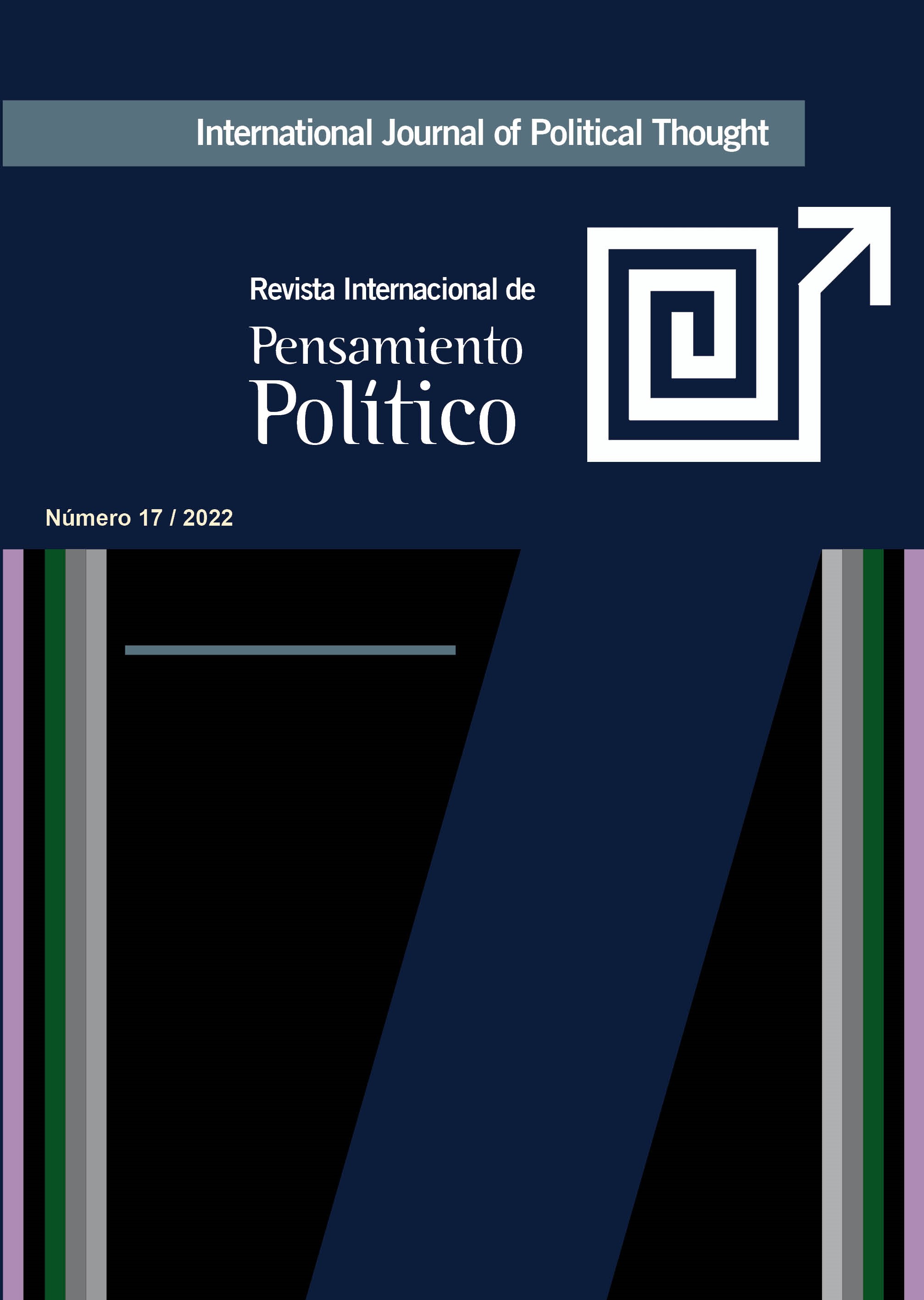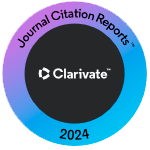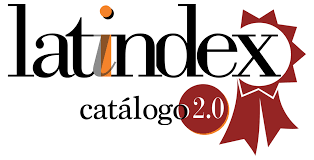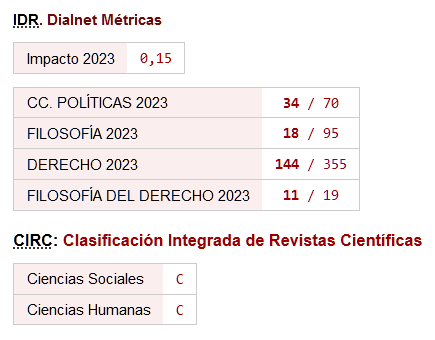Protagonistas de su participación política
Formas actuales de participación convencional, no-convencional y activismo online de la juventud en Europa
DOI:
https://doi.org/10.46661/revintpensampolit.7500Palabras clave:
Participación política, jóvenes, Encuesta Social EuropeaResumen
El presente artículo analiza la relación entre el ciclo vital y la participación política, centrándose en la población joven en Europa. Partiendo de los resultados de la Encuesta Social Europa (2018), el estudio apunta a la consolidación de las pautas del activismo que se alejan de la política convencional. La investigación capta, además, que este sector poblacional se caracteriza por niveles de participación más altos que los otros grupos etarios en las actividades que, de manera directa, permiten visibilizar sus preocupaciones e intereses políticos. Finalmente, se han detectado varias formas de activismo que convergen con las transformaciones de carácter estructural de las pautas de participación política de las sociedades europeas.
Descargas
Citas
Alarcón, F. (2021). "Young People's Political Participation: New and Old Forms in Contemporary Spain", PArtecipazione e COnflitto, 14(2), 914-932.
Anduiza, E.; Cantijoch, M.; Gallego, A. y Salcedo J. (2010). Internet y participación política en España. Madrid: Centro de Investigaciones Sociológicas.
Barnes, S. y Kaase, M. (1979). Political Action. Mass Participation in Five Western Democracies. Londres: Sage.
Brady, H. (1999). "Political Participation", en J. P. Robinson, P.R. Shaver y L. S. Wrightsman (eds.). Measures of Political Attitudes. San Diego: Academic Press, 737-801.
Briggs, J. (2017). "Young People and Participation in Europe", en J. Briggs (ed.). Young People and Political Participation. Londres: Palgrave Macmillan, 63-86. https://doi.org/10.1057/978-1-137-31385-0_3
Calenda, D. y Meijer, A. (2009). "Young people, the Internet and political participation", Information, Communication & Society, 12(6), 879-898. https://doi.org/10.1080/13691180802158508
Cammaerts, B. et al. (2014). "The Myth of Youth Apathy: Young Europeans' Critical Attitudes Toward Democratic Life", American Behavioral Scientist, 58(5), 645-664. https://doi.org/10.1177/0002764213515992
Christensen, H. S. (2011). "Political activities on the Internet: Slacktivism or political participation by other means?", First Monday, 16(2). https://doi.org/10.5210/fm.v16i2.3336
Christensen, H. S. (2012). "Simply slacktivism? Internet participation in Finland", JeDEM - EJournal of EDemocracy and Open Government, 4(1), 1-23. https://doi.org/10.29379/jedem.v4i1.93
Clua, A.; López-Léon, S. y Ferrán-Ferrer, N. (2021). "Knocking on the Public Sphere Door: Does Online Political Participation Make a Difference for Young People in Spain?", en M. Giugni y M. Grasso (eds.). Youth and Politics in Times of Increasing Inequalities. Cham: Palgrave Macmillan.
Coffé, H. (2013). "Gender and Political Participation in Western and Eastern Europe", en K. Demetriou (eds). Democracy in Transition. Berlín: Springer. https://doi.org/10.1007/978-3-642-30068-4_6
Copeland, L. y Boulianne, S. (2022). "Political consumerism: A meta-analysis", International Political Science Review, 43(1), 3-18. https://doi.org/10.1177/0192512120905048
Curtis, J.; Baer, D. y Grabb, E. (2001). "Nations of Joiners: Explaining Voluntary Association Membership in Democratic Societies", American Sociological Review, 66(6), 783-805. https://doi.org/10.2307/3088873
Dalton, R.; Van Sickle, A. y Weldon, S. (2010). "The individual-institutional nexus of protest behaviour", British journal of political science, 40(1), 51-73. https://doi.org/10.1017/S000712340999038X
Dalton, R. y Wattenberg, M. (2000). Parties without partisans: Political change in advanced industrial democracies. Oxford: Oxford University Press.
Dimitrova, D.; Shehata, A.; Strömbäck, J. y Nord, L. (2011). "The Effects of Digital Media on Political Knowledge and Participation in Election Campaigns", Communication Research, 41(1). https://doi.org/10.1177/0093650211426004
Ekman, J. y Amnå, E. (2012). "Political participation and civic engagement: Towards a new typology", Human affairs, 22(3), 283-300. https://doi.org/10.2478/s13374-012-0024-1
Enjolras, B.; Steen-Johnsen, K. y Wollebæk, D. (2013). "Social media and mobilization to offline demonstrations: Transcending participatory divides?", New Media & Society, 15(6), 890-908. https://doi.org/10.1177/1461444812462844
Encuesta Social Europea (2018). European Social Survey European - ESS9. https://doi.org/10.21338/ESS9E03_1. Fecha de consulta: 22/10/2022.
Eurostat (2022). Database. https:// bit.ly/2xo5Cvn. Fecha de consulta: 22/10/2022.
EuroVoc (2022): 7206 Europa. https:// op.europa.eu/es/web/eu-vocabularies/ concept-scheme/-/resource?uri=http:// eurovoc.europa.eu/100277. Fecha de consulta: 22/10/2022.
Feixa, C. (2014). "Juventud y participación política en la era digital: estado del arte versus artes del Estado", en J. Subirats et al. (eds.). Jóvenes, Internet y Política. Madrid: Centro Reina Sofía sobre Adolescencia y Juventud, 96-126.
Fieldhouse, E.; Tranmer, M. y Russell, A. (2007). "Something about young people or something about elections? Electoral participation of young people in Europe", European journal of political research, 46(6), 797-822. https://doi.org/10.1111/j.1475-6765.2007.00713.x
Fraile, M.; Ferrer, M. y Martín, I. (2007). Jóvenes, conocimiento político y participación. Madrid: Centro de Investigaciones Sociológicas.
García, M. y Novo, M. (2017). "The Emergence of the "Conscious Consumer": An Analysis of Political Participation through Purchasing Decisions", Revista Española de Investigaciones Sociológicas, 1(158), 59-78.
Gil, H.; Veenstra, A.; Vraga, E. y Shah, D. (2010). "Digital Democracy: Reimagining Pathways to Political Participation", Journal of Information Technology & Politics, 7(1), 36-51. https://doi.org/10.1080/19331680903316742
Gil, H.; Jung, N. y Valenzuela, S. (2012). "Social Media Use for News and Individuals Social Capital, Civic Engagement and Political Participation", Journal of Computer-Mediated Communication, 17(3), 319-336. https://doi.org/10.1111/j.1083-6101.2012.01574.x
Giugni, M. y Grasso, M. (2015). Austerity and protest: Popular contention in times of economic crisis. Londres: Routledge. https://doi.org/10.4324/9781315568331
Gius, M. (2015). "The Determinants of Political Participation", Journal of the New York State Economics Association, 46, 53-62.
Goldfinch, S.; Gauld, R. y Herbison, P. (2009). "The Participation Divide? Political Participation, Trust in Government, and E-government in Australia and New Zealand", Australian Journal of Public Administration, 68(3), 333-350. https://doi.org/10.1111/j.1467-8500.2009.00643.x
Grasso, M. (2018). "Young People's Political Participation in Europe in Times of Crisis", en S. Pickard y J. Bessant (eds.). Young People Re-Generating Politics in Times of Crises. Cham: Palgrave Macmillan. https://doi.org/10.1007/978-3-319-58250-4_10
Hale, S.; John, P.; Margetts, H. y Yasseri, T. (2018). "How digital design shapes political participation: A natural experiment with social information", PLoS ONE, 13(4): e0196068. https://doi.org/10.1371/journal.pone.0196068
Harris, A.; Wyn, J. y Salem, Y. (2010). "Beyond apathetic or activist youth 'Ordinary' young people and contemporary forms of participation", Young, 18(1), 9-13. https://doi.org/10.1177/110330880901800103
Henn, M. y Foard, N. (2014). "Social differentiation in young people's political participation: The impact of social and educational factors on youth political en gagement in Britain", Journal of Youth Studies, 17(3), 360-380. https://doi.org/10.1080/13676261.2013.830704
Holt, K.; Shehata, A.; Strömbäck, J. y Ljungberg, E. (2013). "Age and the effects of news media attention and social media use on political interest and participation: Do social media function as leveller?", European Journal of Communication, 28(1). https://doi.org/10.1177/0267323112465369
Hooghe, M. y Stolle, D. (2005). "Youth organisations within political parties: Political recruitment and the transformation of party systems", en J. Forbrig (ed.). Revisiting youth political participation. Estrasburgo: Council of Europe Publishing, 43-51.
Inglehart, R. (2003). Human values and social change. Boston: Brill. https://doi.org/10.1163/9789047404361
Jost, J. et al. (2018). "How Social Media Facilitates Political Protest: Information, Motivation, and Social Networks", Political Psychology, 9(S1), 85-118. https://doi.org/10.1111/pops.12478
Jungherr, A. y Jürgens, P. (2012). "The Political Click: Political Participation through E-Petitions in Germany", Policy & Internet, 2(4), 131-165. https://doi.org/10.2202/1944-2866.1084
Katz, R. y Mair, P. (1995). "Changing models of party organization and party democracy: The emergence of the cartel party", Party politics, 1(1), 5-28. https://doi.org/10.1177/1354068895001001001
Kitanova, M. (2020). "Youth political participation in the EU: Evidence from a cross-national analysis", Journal of Youth Studies, 23(7), 819-836. https://doi.org/10.1080/13676261.2019.1636951
Kostelka, F. y Rovny, J. (2019). "It's Not the Left: Ideology and Protest Participation in Old and New Democracies", Comparative Political Studies, 52(11), 1677- 1712. https://doi.org/10.1177/0010414019830717
Margetts, H.; John, P.; Escher, T. y Reissfelder, S. (2011). "Social information and political participation on the internet: An experiment", European Political Science Review, 3(3), 321-344. https://doi.org/10.1017/S1755773911000129
Marsh, D.; O'Toole, T. y Jones, S. (2007). Young people and politics in the UK. Apathy or alienation? Basingstoke: Palgrave Macmillan. https://doi.org/10.1057/9780230625631
Matthes, C. (2021). "Safeguarding Democracy and the Rule of Law by Civil Society Actors? The Case of Poland", en A. Lorenz y L. Anders (eds.). Illiberal trends and anti-EU politics in East Central Europe. Cham: Palgrave Macmillan, 263-281. https://doi.org/10.1007/978-3-030-54674-8_11
Mattila, M. y Papageorgiou, A. (2017). "Disability, perceived discrimination and political participation", International Political Science Review, 38(5), 505-519. https://doi.org/10.1177/0192512116655813
Melo, D. y Stockemer, D. (2014). "Age and political participation in Germany, France and the UK: A comparative analysis", Comparative European Politics, 12(1), 33-53. https://doi.org/10.1057/cep.2012.31
Micheletti, M. (2003). Political Virtue and Shopping. Individuals, Consumerism, and Collective Action. Nueva York: Palgrave Macmillan. https://doi.org/10.1057/9781403973764
Micheletti, M.; Follesdal, A. y Stolle, D. (2004). Politics, products, and markets: Exploring political consumerism past and present. New Brunswick y Londres: Transaction publishers.
Morán, M. L. y Benedicto, J. (2016). "Los jóvenes españoles entre la indignación y la desafección política: Una interpretación desde las identidades ciudadanas", Ultima década, 24(44), 11-38. https://doi.org/10.4067/S0718-22362016000100002
Neilson, L. y Paxton, P. (2010). "Social Capital and Political Consumerism: A Multilevel Analysis", Social Problems, 57(1), 5-24. https://doi.org/10.1525/sp.2010.57.1.5
Nonomura, R. (2017). "Political consumerism and the participation gap: Are boycotting and 'buycotting' youth-based activities?", Journal of Youth Studies, 20(2), 234-251. https://doi.org/10.1080/13676261.2016.1206861
Norris, P. (2004). Young people & political activism. Cambridge: John F. Kennedy School of Government.
Oliart, P. y Feixa, C. (2012). "Introduction: Youth Studies in Latin America. On Social Actors, Public Policies and New Citizenships", Young, 20(4), 329-344. https://doi.org/10.1177/110330881202000402
Oser, J. y Hooghe, M. (2018). "Democratic ideals and levels of political participation: The role of political and social conceptualisations of democracy", The British Journal of Politics and International Relations, 20(3), 711-730. https://doi.org/10.1177/1369148118768140
Park, N.; Kee, K. y Valenzuela, S. (2009). "Being immersed in social networking environment: Facebook groups, uses and gratifications, and social outcomes", Cyberpsychology & Behavior, 12(6), 729-733. https://doi.org/10.1089/cpb.2009.0003
Persson, M. (2015). "Education and Political Participation", British Journal of Political Science, 45(3), 689-703. https://doi.org/10.1017/S0007123413000409
Pickard, S. (2015). "Trying to turn up the turnout. Youth wings and the youth vote in the 2015 general election", French Journal of British Studies, 20(3). https://doi.org/10.4000/rfcb.503
Plagnol, A. y Huppert, F. (2010). "Happy to help? Exploring the factors associated with variations in rates of volunteering across Europe", Social Indicators Research, 97(2), 157-176. https://doi.org/10.1007/s11205-009-9494-x
Pontes, A.; Henn, M. y Griffiths, M. (2018). "Towards a conceptualization of young people's political engagement: A qualitative focus group study", Societies, 8(1). https://doi.org/10.3390/soc8010017
Quintelier, E. (2007). "Differences in political participation between young and old people", Contemporary Politics, 13(2), 165-180. https://doi.org/10.1080/13569770701562658
Robertson, S.; Vatrapu, R. y Medina, R. (2010). "Online Video "Friends" Social Networking: Overlapping Online Public Spheres in the 2008 U.S. Presidential Election", Journal of Information Technology & Politics, 7(2-3), 182-201. https://doi.org/10.1080/19331681003753420
Sardinha, B. (2011). The economics of the volunteering decision. Évora: Universidade de Évora.
Saunders, C. (2014). "Anti-politics in Action? Measurement Dilemmas in the Study of Unconventional Political Participation", Political Research Quarterly, 67(3), 574-588. https://doi.org/10.1177/1065912914530513
Schlozman, K.; Verba, S. y Brady, H. (2010). "Weapon of the strong? Participatory inequality and the internet", Perspectives on Politics, 8(2), 487-510. https://doi.org/10.1017/S1537592710001210
Sloam, J. (2014). "New voice, less equal: The civic and political engagement of young people in the United States and Europe", Comparative Political Studies, 47(5), 663-688. https://doi.org/10.1177/0010414012453441
Sloam, J. (2016). "Diversity and voice: The political participation of young people in the European Union", The British Journal of Politics and International Relations, 18(3), 521-537. https://doi.org/10.1177/1369148116647176
Soriano, R.; Barros, F.; Mahmud, B. y Gozzo, S. (2020). "The world in one click: the digital divide associated with e-commerce in southern Europe", en: F. Entrena, R. Soriano y R. Duque. Social Problems in Southern Europe. Cheltenham: Edward Elgar, 130-142. https://doi.org/10.4337/9781789901436.00020
Stockemer, D. y Sundström, A. (2021). "Rule by the elderly: the absence of youth in cabinets of France, Germany and the UK", French Politics, 19(4), 440-449. https://doi.org/10.1057/s41253-021-00158-6
Stolle, D.; Hooghe, M. y Micheletti, M. (2005). "Politics in the Supermarket: Political Consumerism as a Form of Political Participation", International Political Science Review, 26(3), 245-269. https://doi.org/10.1177/0192512105053784
Strømsnes, K. (2009). "Political Consumerism: A Substitute for or Supplement to Conventional Political Participation?", Journal of Civil Society, 5(3), 303-314. https://doi.org/10.1080/17448680903351834
Tcheocharis, Y. y van Deth, J. (2018). "The continuous expansion of citizen participation: A new taxonomy", European Political Science Review, 10(1), 139-163. https://doi.org/10.1017/S1755773916000230
Torcal, M.; Font J. y Montero, J. R. (2006). Ciudadanos, asociaciones y par ticipación en España. Madrid: Centro de Investigaciones Sociológicas.
Touraine, A. (2001). ¿Qué es la democracia? Madrid: Fondo de Cultura Económica.
Valenzuela, S.; Park, N. y Kee, K. (2009). "Is There Social Capital in a Social Network Site?: Facebook Use and College Students' Life Satisfaction, Trust, and Participation", Journal of Computer-Mediated Communication, 14(4), 875-901. https://doi.org/10.1111/j.1083-6101.2009.01474.x
Vallès, J. y Martí, S. (2020). Ciencia política: un manual. Madrid: Ariel.
Van Aelst, P. y Walgrave, S. (2001). "Who is that (wo) man in the street? From the normalisation of protest to the normalisation", European Journal of Political Research, 39(4), 461-486. https://doi.org/10.1111/1475-6765.00582
Van Biezen, I.; Mair, P. y Poguntke, T. (2012). "Going, going,... gone? The decline of party membership in contemporary Europe", European journal of political research, 51(1), 24-56. https://doi.org/10.1111/j.1475-6765.2011.01995.x
Van der Meer, T.; van Deth, J. y Scheepers, P. (2009). "The Politicized Participant: Ideology and Political Action in 20 Democracies", Comparative Political Studies, 42(11), 1426-1457. https://doi.org/10.1177/0010414009332136
Van Deth, J. W. (2016). "What is political participation?", The international encyclopedia of political communication, 49(3), 349-367. https://doi.org/10.1093/acrefore/9780190228637.013.68
Verba, S. y Nie, N. (1987). Participation in America: Political democracy and social equality. Chicago: University of Chicago Press.
Verba, S.; Schlozman, K. y Brady, H. (1995). Voice and Equality: Civic Voluntarism in American Politics. Cambridge: Harvard University Press. https://doi.org/10.2307/j.ctv1pnc1k7
Vitak, J. et al. (2011). "It's Complicated: Facebook Users' Political Participation in the 2008 Election", Cyberpsychology, Behavior, and Social Networking, 14(3), 107-114. https://doi.org/10.1089/cyber.2009.0226
Vraga, E.; Thorson, K.; Kligler-Vilenchik, N. y Gee, E. (2015). "How individual sensitivities to disagreement shape youth political expression on Facebook", Computers in Human Behavior, 45, 281-289. https://doi.org/10.1016/j.chb.2014.12.025
Weiss, J. (2020). "What Is Youth Political Participation? Literature Review on Youth Political Participation and Political Attitudes", Frontiers in Political Science, 2(1). https://doi.org/10.3389/fpos.2020.00001
Wright, S. (2015). "'Success' and online political participation: The case of Downing Street E-petitions", Information, Communication & Society, 19(6), 843- 857. https://doi.org/10.1080/1369118X.2015.1080285
Descargas
Publicado
Cómo citar
Número
Sección
Licencia
Derechos de autor 2022 Rita Sobczyk, José María García de Diego, Francisco Barros Rodríguez

Esta obra está bajo una licencia internacional Creative Commons Atribución-NoComercial-CompartirIgual 4.0.
Política de acceso abierto
Se permite el acceso libre y abierto de cualquier interesado a todos los contenidos de los números de la revista, sin costo alguno, pudiendo imprimir y trasladar todos los artículos, con la única condición de precisar la fuente y la autoría.
La revista: a) no cobra a las autorías costes por el procesamiento de los artículos ni por el envío de los mismos, b) mantiene el copyright para los autores sin restricciones, c) facilita a los autores conservar sus derechos de publicación sin limitaciones.
La Revista Internacional de Pensamiento Político es una obra original del Laboratorio de Ideas y Prácticas Políticas de la Universidad Pablo de Olavide. Todos los artículos incluidos en la Revista son obra original de sus respectivas autorías. Esta Revista se ofrece libremente a la comunidad científica y académica sin coste alguno y libera los contenidos de acuerdo a la licencia "Reconocimiento-NoComercial-CompartirIgual 4.0 CC BY-NC-SA" del proyecto Creative Commons dispuesta en la siguiente url: https://creativecommons.org/licenses/by-nc-sa/4.0/legalcode
Si deseas traducir o compilar alguno de los artículos aquí disponibles, por favor, ponte en contacto













